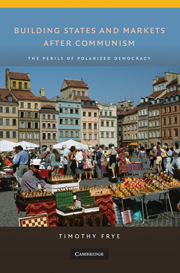Book contents
- Frontmatter
- Contents
- List of Tables and Figures
- Acknowledgments
- Introduction
- 1 The Political Logic of Economic and Institutional Reform
- 2 Political Polarization and Economic Inequality
- 3 The Pace and Consistency of Reform
- 4 Political Polarization and Economic Growth
- 5 Political Polarization and Policy Instability: The View from the Firm
- 6 Nationalism and Endogenous Polarization
- 7 Russia: Polarization, Autocracy, and Reform
- 8 Bulgaria: Polarization, Democracy, and Reform
- 9 Poland: Robust Democracy and Rapid Reform
- 10 Uzbekistan: Autocracy and Inconsistent Gradualism
- 11 Conclusion
- References
- Index
- Titles in the series
2 - Political Polarization and Economic Inequality
Published online by Cambridge University Press: 05 June 2012
- Frontmatter
- Contents
- List of Tables and Figures
- Acknowledgments
- Introduction
- 1 The Political Logic of Economic and Institutional Reform
- 2 Political Polarization and Economic Inequality
- 3 The Pace and Consistency of Reform
- 4 Political Polarization and Economic Growth
- 5 Political Polarization and Policy Instability: The View from the Firm
- 6 Nationalism and Endogenous Polarization
- 7 Russia: Polarization, Autocracy, and Reform
- 8 Bulgaria: Polarization, Democracy, and Reform
- 9 Poland: Robust Democracy and Rapid Reform
- 10 Uzbekistan: Autocracy and Inconsistent Gradualism
- 11 Conclusion
- References
- Index
- Titles in the series
Summary
Measure what is measurable, and make measurable what is not so.
Galileo GalileiThe previous chapter emphasized how executive partisanship and political polarization influence economic policy making but did not define or describe these terms with much rigor. This chapter seeks to do so. It begins by discussing the measurement of partisanship and political polarization before presenting data on levels of political polarization. Clarifying these concepts is important, given that scholars use the terms in different ways. Moreover, the peculiarities of the postcommunist cases present special challenges for measuring partisanship and polarization. At the start of the transformation, parties and factions did not have long histories of policy making that could serve as reliable guides to partisanship. In addition, the postcommunist cases include presidential and parliamentary regimes as well as democracies and autocracies, a variability that makes defining these terms especially challenging.
In addition, this chapter identifies economic inequality as a potential social base for political polarization. Increases in economic inequality early in the transformation map well onto levels of polarization, although it is difficult to make claims about the direction of causality. Countries that experienced large increases in income inequality in the early years of the transformation have significantly more polarized political systems later in the transformation. Large gaps in income between rich and poor are a feature of polarized political systems, suggesting that income inequality may provide a social base for political polarization. Establishing that political polarization has deeper roots in society suggests that it may be more than epiphenomenal.
- Type
- Chapter
- Information
- Building States and Markets after CommunismThe Perils of Polarized Democracy, pp. 48 - 69Publisher: Cambridge University PressPrint publication year: 2010
- 1
- Cited by

